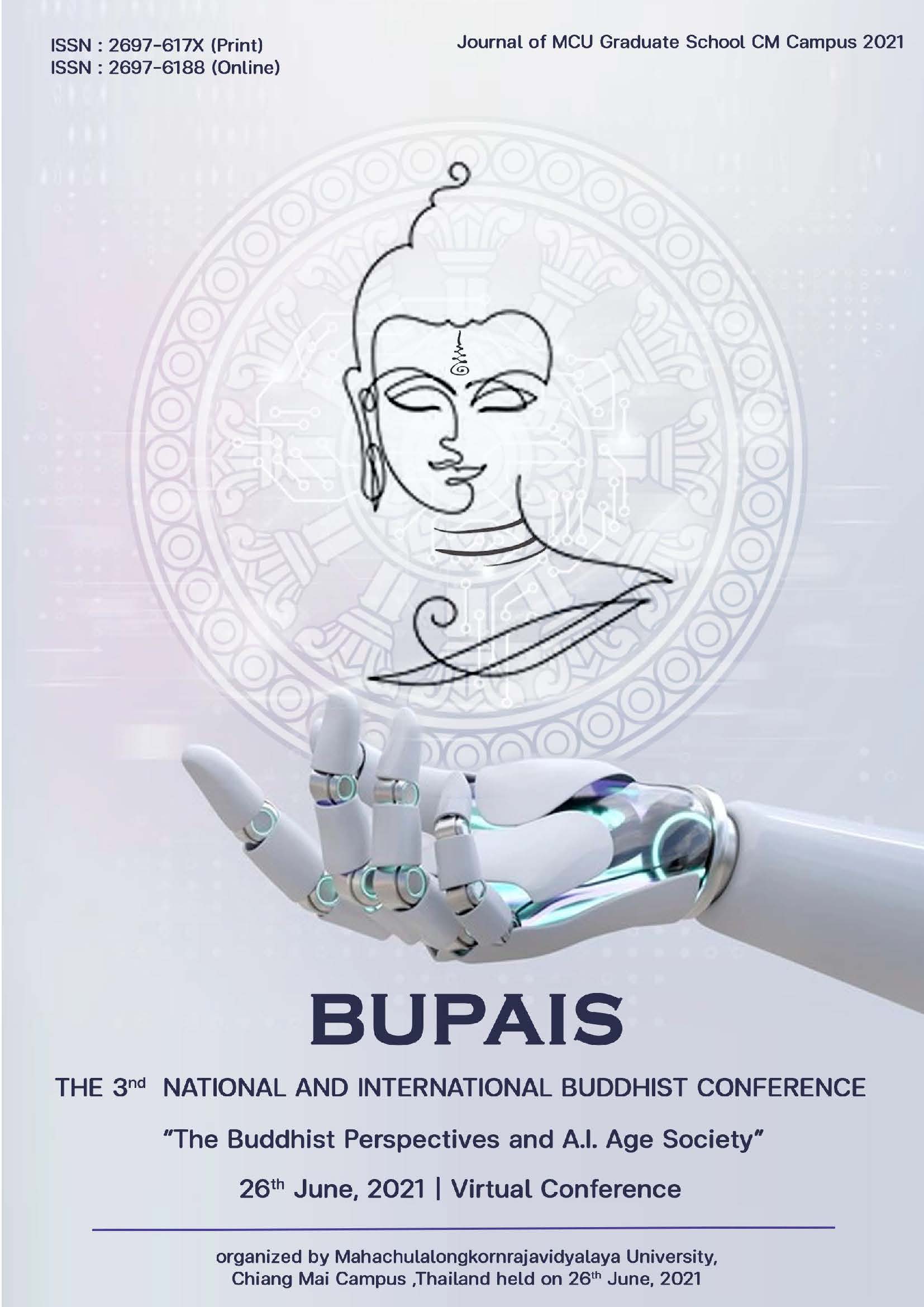วิเคราะห์แนวทางการปฏิบัติเพื่อเป็นเทวดาในพระไตรปิฎก
คำสำคัญ:
แนวทางการปฏิบัติ, เทวดา
บทคัดย่อ
การวิจัยเรื่อง “วิเคราะห์แนวทางการปฏิบัติเพื่อเป็นเทวดาในพระไตรปิฎก” มีวัตถุประสงค์ 3 ประการ คือ 1) ศึกษาเทวดาที่ปรากฏในพระไตรปิฎก 2) ศึกษาแนวทางการเป็นเทวดาในพระไตรปิฎก และ 3) วิเคราะห์แนวทางการปฏิบัติเป็นเทวดาในพระไตรปิฎก เป็นการวิจัยเชิงเอกคุณภาพ โดยศึกษาจากพระไตรปิฎก อรรถคาถา เอกสาร ตำรา และงานวิจัยที่เกี่ยวข้อง เพื่อนำมาอธิบายให้สอดคล้องกับวัตถุประสงค์ที่กำหนดไว้ ผลการวิจัยพบว่า
- ในพระไตรปิฎกกล่าวถึงเทวดาไว้ 3 ประเภท คือ 1. สมมติเทพ เป็นเทวดาโดยสมมติ 2. อุปปัตติเทพ เป็นเทวดาโดยกำเนิด และ 3. วิสุทธิเทพ คือ การเป็นเทวดาโดยความบริสุทธิ์ ภพภูมิของเทวดามีทั้งหมด 16 ชั้น แต่ละชั้นต่างก็ได้กำหนดช่วงอายุในการอาศัยต่างกัน โดยพิจารณาจากผลบุญที่ได้กระทำไว้เมื่อยังเป็นมนุษย์ ประกอบไปด้วย อรูปพรหม 4 ชั้น เทวโลก คือ อาณาจักรของเทพ ได้แก่ สวรรค์ 6 ชั้น ส่วนมนุษย์ ได้แก่ ภพภูมิของมนุษย์อยู่ชั้นชนิดเดียวกับสวรรค์ 6 ชั้น เรียกว่ากามสุคติภูมิ
- การเป็นเทวดาในสวรรค์ที่มีความอุดมสมบูรณ์ด้วยเครื่องอุปโภคบริโภคอันเป็นทิพย์มากมายนั้นขึ้นอยู่กับบุญบารมีที่ได้สั่งสมไว้เมื่อครั้งเป็นมนุษย์ได้ทำบุญให้ทาน รักษาศีล ทำอัญชลีกรรมต่อท่านผู้มีศีล ตามประทีปโคมไฟ ฟังธรรม ตั้งอยู่ในศีลธรรม เจริญภาวนา มีความสัตย์ ความไม่โกรธ ความซื่อสัตย์ต่อสามี บำรุงเลี้ยงดูบิดามารดา เป็นต้น ดังนั้น หลักการทำบุญกุศลที่ถูกต้องตามหลักของพระพุทธศาสนามี 3 ประการ ได้แก่ (1) หลักทาน การให้ทานที่สมบูรณ์ครบถ้วนด้วยจิตเลื่อมใสศรัทธาจะมีผลมากมีอานิสงส์มาก (2) หลักศีล รักษาศีล 5 รักษาอุโบสถศีลเป็นประจำ ตั้งใจงดเว้นจากบาปอกุศลทั้งหลาย ย่อมส่งผลให้อยู่เป็นสุขในภพปัจจุบัน และภพหน้า (3) หลักภาวนา ได้ฟังธรรม เจริญสมถกรรมฐาน วิปัสสนากรรมฐาน พิจารณาสภาวธรรมต่าง ๆ ให้เห็นแจ้งตามความเป็นจริงจนบรรลุธรรมขั้นสูงสุด คือ พระนิพพาน
- แนวทางปฏิบัติเพื่อไปเกิดเป็นเทวดาในพระไตรปิฎกมี 3 แนวทาง คือ 1. การให้ทาน 2. การรักษาศีล และ 3. การเจริญจิตภาวนา เรียกกว่า บุญกิริยาวัตถุ ได้แก่ ทานมัย การทำบุญด้วยวัตถุทาน การให้ทานด้วยข้าว น้ำ ผ้า ยาน ดอกไม้ ของหอม เครื่องลูบไล้ ที่นอน ตั่ง เตียง และเครื่องประทีป การให้ทานจึงเป็นได้ทั้งหลักการ และแนวทางปฏิบัติที่มีความสัมพันธ์นำบุคคลไปเกิดเป็นเทวดาในชั้นภูมิต่าง ๆ สีลมัย บุญสำเร็จด้วยการรักษาศีล เพราะศีลเป็นแนวทางปฏิบัติในการสร้างวินัยในการอยู่ร่วมกันระหว่างมนุษย์กับมนุษย์ มนุษย์กับสังคม และมนุษย์กับธรรมชาติ เพื่อนำมาซึ่งความผาสุกแก่ตนเองและสังคมให้เกิดความเรียบร้อยดีงาม ภาวนามัย เป็นการปฏิบัติหลักภาวนาโดยอาศัยเหตุ 4 ประการ คือ กายภาวนา สีลภาวนา จิตภาวนา และปัญญาภาวนา สามารถนำมาเป็นแนวทางปฏิบัติเพื่อละความชั่วทางกาย ทางวาจา ทางใจ ทำตนให้รุ่งเรืองภายนอก คือ มีข้าวของ เงินทอง ลาภ ยศ สรรเสริญ สุข และรุ่งเรืองภายใน คือ การตั้งตนอยู่ในบุญกิริยาวัตถุ 3 สามารถยังมนุษย์สมบัติ สวรรค์สมบัติ นิพพานสมบัติ ให้สำเร็จด้วยอานุภาพแห่งบุญกุศลที่ได้สั่งสมมา
บรรณานุกรม
พระจักรกฤษณ์ ธีรธมฺโม. (2558). ศึกษาวิเคราะห์แนวคิดเรื่องเทวดาในคัมภีร์จักกวาฬทีปนี.
วารสารพุทธศาสตร์ศึกษา. ปีที่ 6 ฉบับที่ 1 (มกราคม – มิถุนายน): 84 – 85.
พระธรรมปิฎก (ป.อ.ปยุตฺโต). (2542). พุทธวิธีในการสอน. พิมพ์ครั้งที่ 6. กรุงเทพมหานคร:
บริษัท โอเอ็นจีการพิมพ์ จำกัด.
พระสุธีวรญาณ (ณรงค์ จิตฺตโสภโณ). (2542). แก่นธรรมในสังยุตติกนิกาย ในเก็บเพ็ชรจากพระไตรปิฎก.
กรุงเทพมหานคร: มหาวิทยาลัยมหาจุฬาลงกรณราชวิทยาลัย
วารสารพุทธศาสตร์ศึกษา. ปีที่ 6 ฉบับที่ 1 (มกราคม – มิถุนายน): 84 – 85.
พระธรรมปิฎก (ป.อ.ปยุตฺโต). (2542). พุทธวิธีในการสอน. พิมพ์ครั้งที่ 6. กรุงเทพมหานคร:
บริษัท โอเอ็นจีการพิมพ์ จำกัด.
พระสุธีวรญาณ (ณรงค์ จิตฺตโสภโณ). (2542). แก่นธรรมในสังยุตติกนิกาย ในเก็บเพ็ชรจากพระไตรปิฎก.
กรุงเทพมหานคร: มหาวิทยาลัยมหาจุฬาลงกรณราชวิทยาลัย
เผยแพร่แล้ว
2022-02-11

